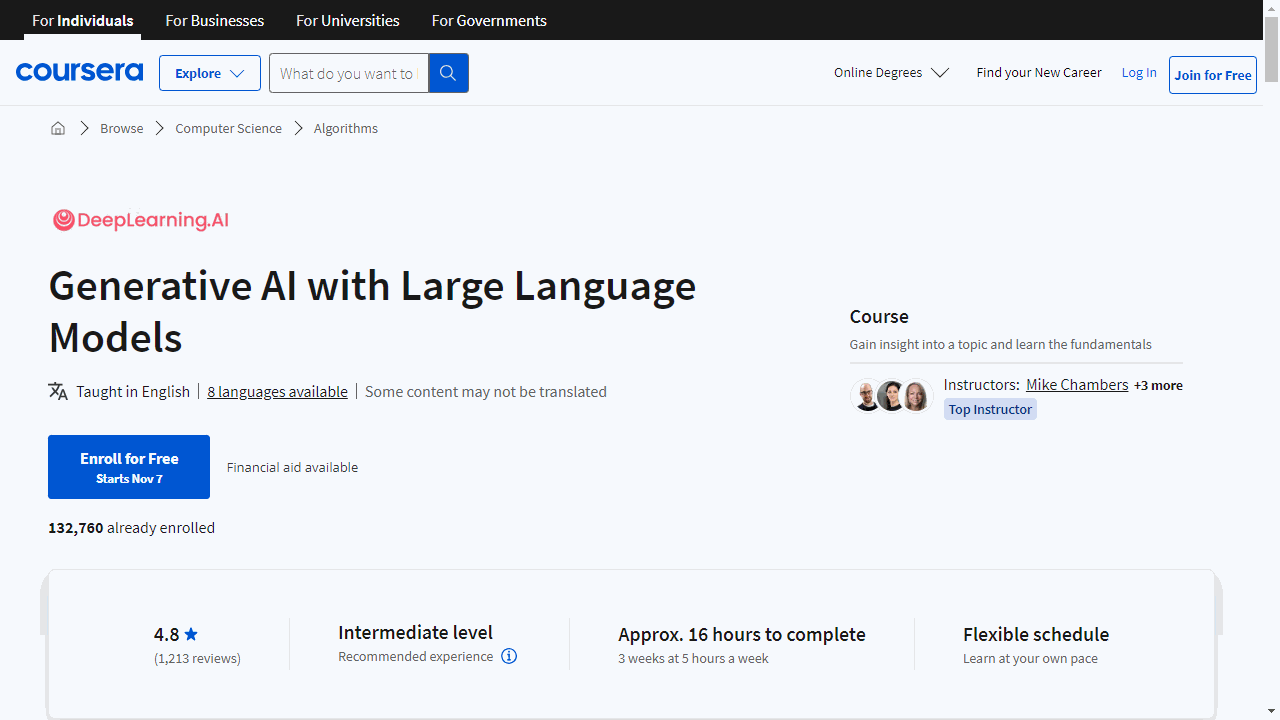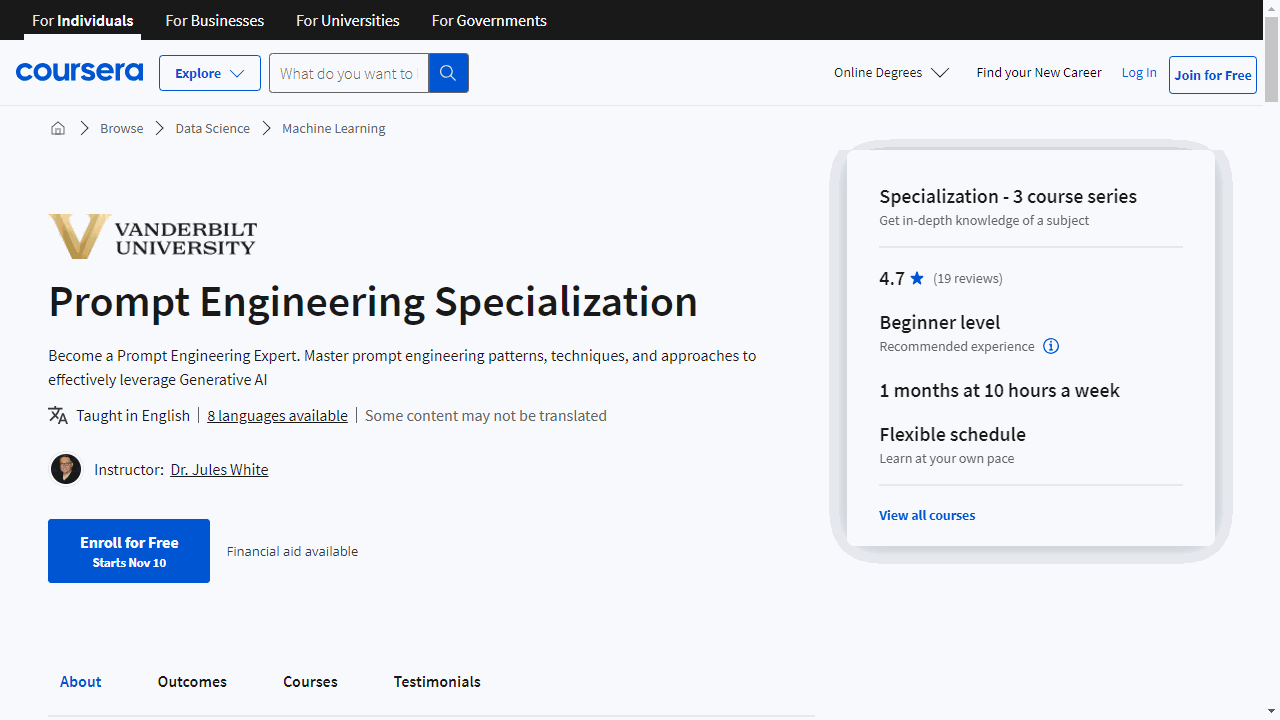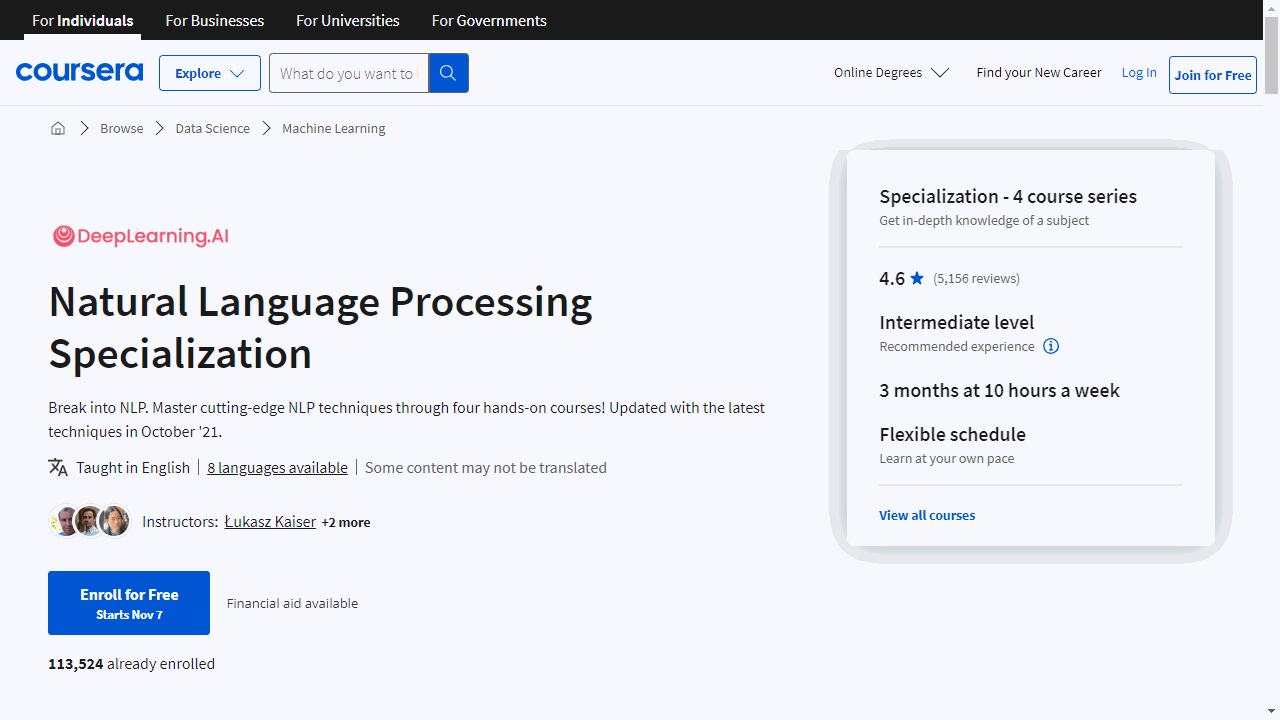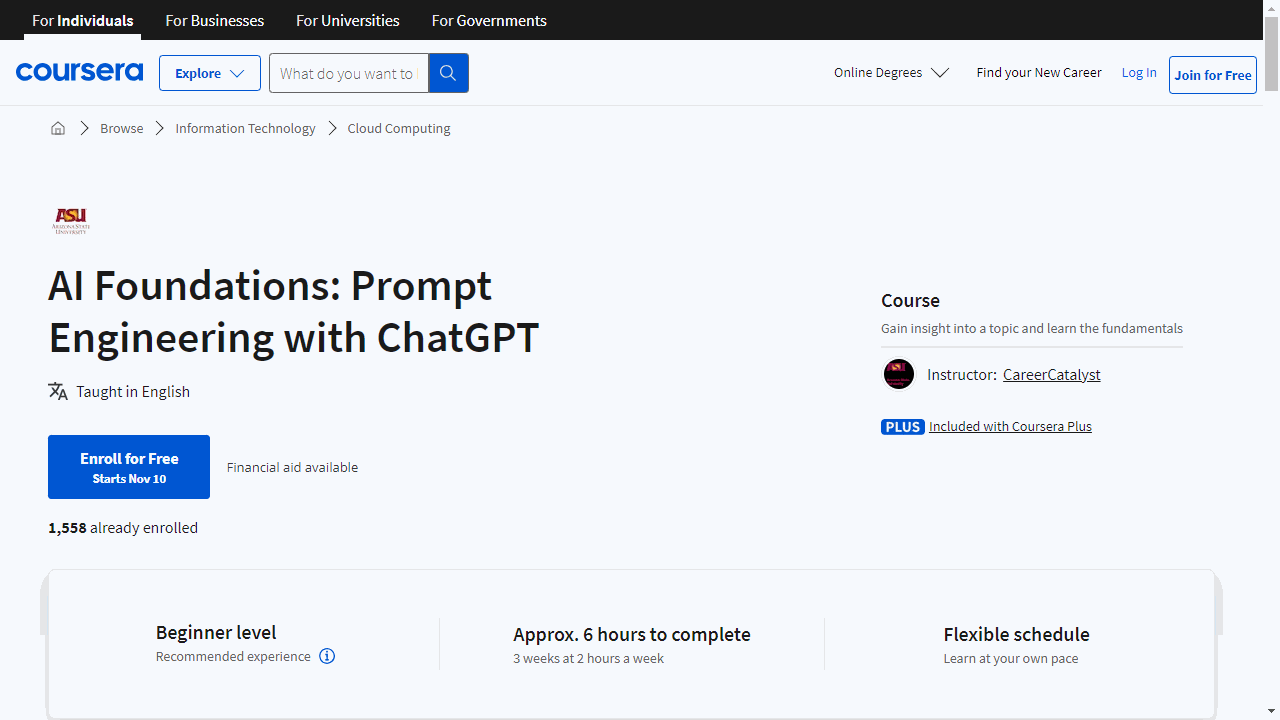Large language models (LLMs) are a cutting-edge technology in the field of artificial intelligence, capable of generating human-like text, translating languages, writing different kinds of creative content, and answering your questions in an informative way.
They’re revolutionizing how we interact with computers and have the potential to transform industries from customer service to scientific research.
Learning about LLMs can equip you with the skills to leverage their power, build innovative applications, and stay ahead of the curve in the rapidly evolving AI landscape.
Finding the right course on LLMs can be a challenge, as there are many options available with varying levels of depth and focus.
You’re looking for a comprehensive program that explains the fundamentals of LLMs, delves into practical applications, and guides you through the ethical considerations surrounding this powerful technology.
For the best LLM course overall on Coursera, we recommend the “Prompt Engineering Specialization” offered by Vanderbilt University.
This specialization goes beyond simply introducing LLMs, focusing instead on the critical skill of prompt engineering—the art of crafting effective prompts to elicit the best results from these models.
It provides a hands-on approach to learning, equipping you with the skills to harness the power of LLMs for tasks ranging from creative writing to data analysis.
This is just the beginning of your LLM journey.
Keep reading to discover more options that delve deeper into specific aspects of LLMs, from their technical architecture to their ethical implications.
Prompt Engineering Specialization
This series of courses, offered by Vanderbilt University, is designed to equip you with the skills to harness the power of tools like ChatGPT (OpenAI) effectively.
The course “Prompt Engineering for ChatGPT” is a comprehensive introduction to becoming a proficient user of generative AI.
You’ll learn to craft prompts that tap into the AI’s capabilities, enabling you to tackle a wide array of tasks more efficiently, from writing and summarization to complex problem-solving.
Moving on, “ChatGPT Advanced Data Analysis” is a practical course that teaches you to leverage AI for data science tasks without needing a background in programming.
You’ll discover how to transform raw data into compelling presentations, extract valuable insights from documents, and even automate routine content creation.
This course is about enhancing your ability to handle data with the help of AI, making your workflow more efficient.
Lastly, “Trustworthy Generative AI” addresses the critical aspect of reliability in AI outputs.
This course provides strategies for selecting suitable problems for AI, designing prompts that minimize risks, and verifying the information generated.
It’s about building a foundation of trust in the AI’s capabilities and integrating it into your creative and analytical processes.
The focus is on practical application, ensuring that what you learn will have real-world benefits.
Natural Language Processing Specialization By DeepLearning.AI
Provider: DeepLearning.AI
This series is a goldmine for anyone eager to master the art of teaching computers to understand human language. Let’s dive into what makes each course stand out and why they’re worth your time.
Start your journey with “Natural Language Processing with Classification and Vector Spaces.”
Here, you’ll unlock the secrets of sentiment analysis, learning to gauge the emotions behind tweets with logistic regression and naïve Bayes.
You’ll also explore the connections between words using vector space models and even dip your toes into machine translation, crafting a simple English to French translator.
This course sets the stage for you to create applications that can analyze text and answer questions with precision.
Then, there’s “Natural Language Processing with Probabilistic Models.”
Ever been saved by auto-correct when texting? You’ll get to build one yourself, understanding the magic behind those helpful suggestions.
You’ll also tackle part-of-speech tagging with the Viterbi Algorithm, a cornerstone of computational linguistics. And for a cherry on top, you’ll construct a Word2Vec model, teaching a neural network to understand word meanings through embeddings.
As you progress to “Natural Language Processing with Sequence Models,” things get even more exciting.
Now you will train neural networks to perform sentiment analysis on tweets, and generate text.
You’ll also learn named entity recognition to extract key information from sentences. Plus, you’ll experiment with ‘Siamese’ network models to identify questions with the same intent but different wording.
Cap off your learning with “Natural Language Processing with Attention Models.”
Here, you’ll translate full sentences into German and summarize blocks of text using cutting-edge attention models. You’ll also get hands-on with T5 and BERT, the powerhouses of NLP, for question-answering tasks. And if you’ve ever dreamed of creating a chatbot, this course will show you how, using a Reformer model.
The brains behind this Specialization are Younes Bensouda Mourri from Stanford, Łukasz Kaiser from Google Brain.
With a bit of machine learning and Python knowledge in your toolkit, you’re all set to embark on an NLP adventure that could transform your career in data science.
Generative AI with Large Language Models
This course offers a comprehensive journey through the landscape of Generative AI, providing a blend of foundational knowledge and practical application.
The course begins with an accessible introduction to Generative AI and Large Language Models (LLMs), setting the stage for what’s to come.
You’ll explore the evolution of text generation, moving from pre-transformer techniques to the cutting-edge transformer architecture that’s reshaping how machines understand and produce language.
What sets this course apart is its focus on the practical side of AI. You’ll learn the art of prompt engineering—how to effectively communicate with AI to elicit the best responses.
The course also walks you through the entire Generative AI project lifecycle, giving you a holistic view of the process from conception to completion.
Through AWS labs, you’ll confront the challenges of training LLMs firsthand. For those interested in the technical aspects, there’s additional content on optimizing multi-GPU strategies for more efficient computing.
As you progress to Week 2, the course delves into the nuances of model fine-tuning.
You’ll discover how to tailor models to specific tasks, and you’ll be introduced to PEFT techniques such as LoRA and Soft prompts. These techniques make it possible to fine-tune models much faster and with minimal data.
The third week addresses the ethical dimension of AI. You’ll engage with the concept of RLHF, learning how to align AI behavior with human values—a critical skill in today’s tech landscape.
For those with a keen interest in the mechanics of AI, there’s an optional deep dive into Proximal Policy Optimization.
Beyond building models, the course equips you with the knowledge to integrate LLMs into real-world applications.
You’ll explore how to enhance AI reasoning and planning capabilities, and you’ll gain insights into advanced concepts like program-aided language models.
The course concludes with a thoughtful discussion on Responsible AI, ensuring that you’re not only technically proficient but also ethically aware.
AI Foundations: Prompt Engineering with ChatGPT
The journey begins with an orientation by Andrew Maynard, who sets the stage for what you’ll learn. This isn’t just a cursory overview; it’s a detailed roadmap to help you navigate the course with confidence.
You’ll then delve into the core principles of ChatGPT, framed by the RACCCA Framework.
This acronym stands for Relevance, Accuracy, Completeness, Clarity, Coherence, and Appropriateness, and it’s a systematic approach to crafting prompts that yield meaningful AI responses.
As you progress to Module 2, the course shifts from theory to application.
Here, you’ll start to see the power of your new skills in action. You’ll practice creating prompts that leverage ChatGPT’s capabilities, gaining valuable experience that goes beyond textbook learning.
The course also introduces Prompt Templates, a practical tool that streamlines your interactions with AI.
These templates are not just time-savers; they’re a way to achieve consistency and precision in your prompts, much like following a well-tested recipe ensures a great meal.
In the section on Imaginative Prompt Engineering, creativity takes center stage.
This part of the course empowers you to ask innovative questions and push the boundaries of what you thought possible with AI.
It’s an opportunity to blend your unique ideas with the technical prowess of ChatGPT.




